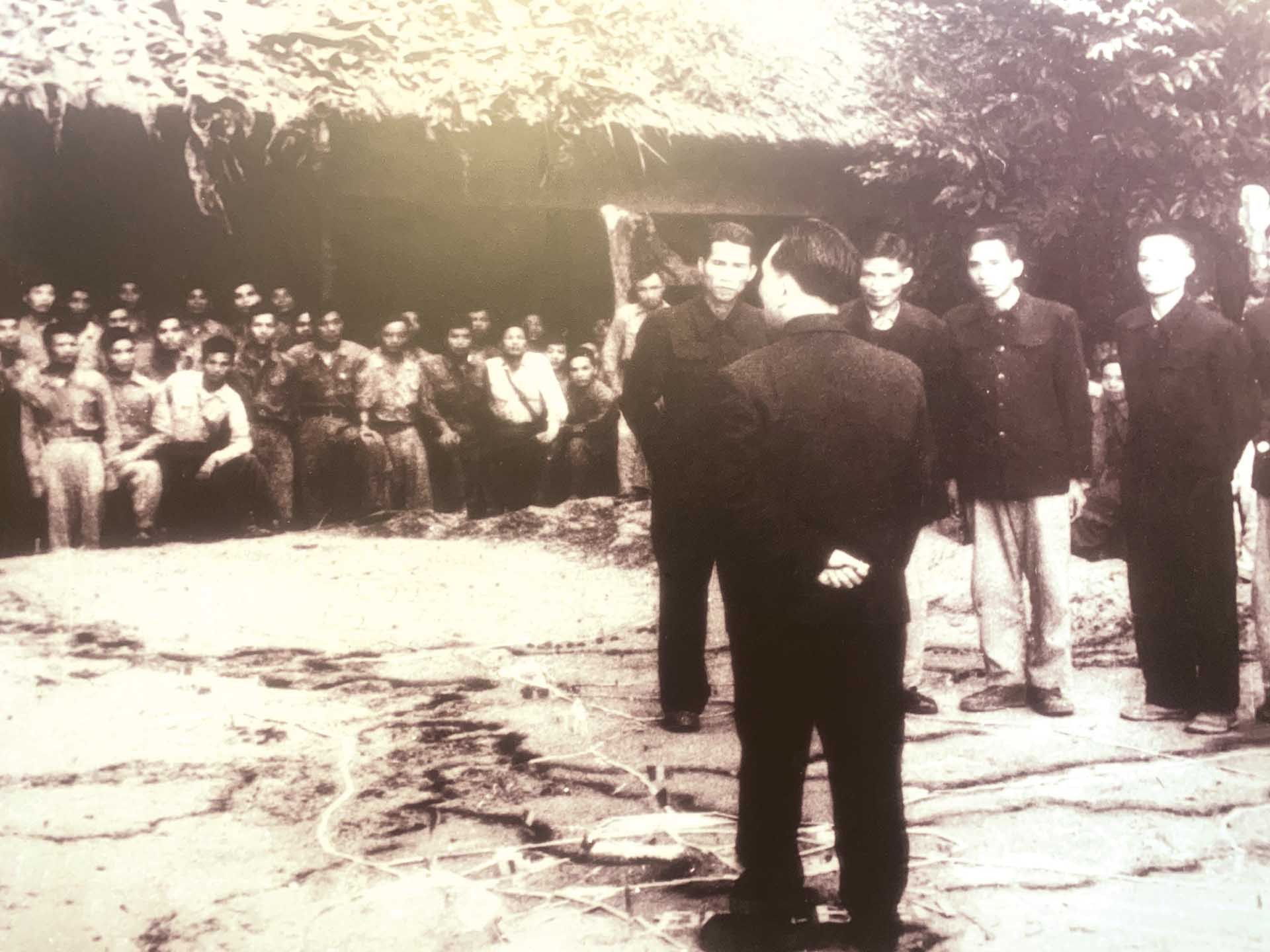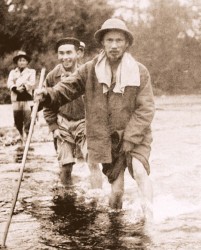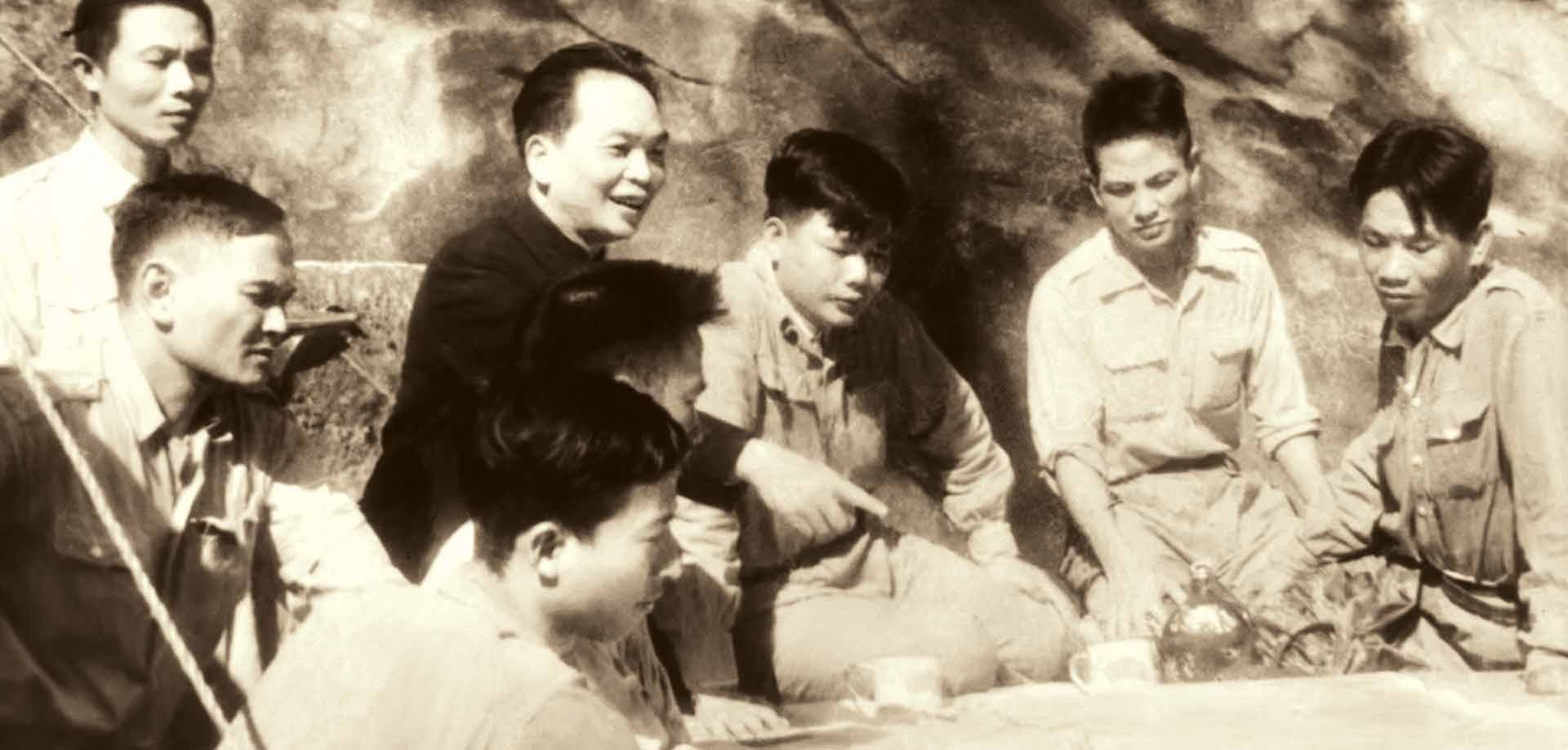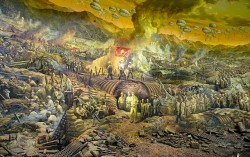
General Vo Nguyen Giap with Dien Bien Phu campaign
Latest
 |
| General Vo Nguyen Giap assigned combat targets to units participating in the Dien Bien Phu campaign on January 14, 1954. (Photo: VNA) |
The Dien Bien Phu victory that “illustrious in five continents, a seismic event on earth” took place 70 years ago, but one thing is convinced, for the soldiers, for the Vietnamese as well as many peoples around the world, including those who used to be once opponents standing on the opposite side of the battle line, that the name “Dien Bien Phu - Vo Nguyen Giap” is always a phrase that blends into one clause and always permanent when this important historical event is mentioned.
In the viewpoint of many people, General and Commander-in-Chief Vo Nguyen Giap is not only a “politician ahead of the military man” but also a “great tree spreading the shade of humanity.”
Motto “firmly attack, firmly succeed”
It is not a coincidence that when deciding to launch the Dien Bien Phu campaign, the Politburo and President Ho Chi Minh placed absolute trust and mandated Commander-in-Chief Vo Nguyen Giap with the responsibility of Commander and Secretary of the Party Committee of the campaign.
Before setting out for battle, Uncle Ho advised: “The Commander-in-Chief is going to the front. The General is seconded l. I give you full authority to make decisions. This battle is imperatively important, we must attack to win. Only if we are ensured to win will we attack decisively, if not sure, do not attack.”
Talking about the Dien Bien Phu campaign, it is to mention the decision to change the combat motto, from “Blitzkrieg quick attack, resolve quickly” to “attack decisively, advance decisively” - a historic decision in a historic campaign, of which General Vo Nguyen Giap was the architect.
| More from WVR |
 Stories about Uncle Ho's memorabilia related to Dien Bien Phu campaign Stories about Uncle Ho's memorabilia related to Dien Bien Phu campaign |
As a person who “does the best for public service” and always knew how to promote the role of the teamwork, although he was the highest commander with full authority to make final decisions, General Vo Nguyen Giap did not overuse his full powers.
Before a decision on vital issues, he always discussed them at the Party Committee, the Campaign Command, and consulted with the Advisory Commission to reach consensus and agreement.
After carefully studying and he comprehended the actual situation, the General spent 11 days and nights without normal proper meals or sleep, pondering and listening to the opinions of unit commanders, he communicated and discussed with the Party Committee, Campaign Command and the advisory commission to ensure victory for this decisive battle and minimize losses.
On the morning of January 26, 1954, General Vo Nguyen Giap decided to change the combat motto, and at the same time ordered the delay in firing, withdrew the artillery, and all re-prepared according to the motto “attack decisively, advance decisively.”
That decision was brought up for plenary discussion at the Party Committee Conference and the Expansion Campaign Command Committee at Na Tau Command Post at noon on January 26, 1954. The decision to change the combat motto demonstrates the sharp military thinking and bravery of the leader, but at the same time is also a manifestation of a deep understanding of Ho Chi Minh's military ideology of “fighting for sure victory.”
Being brave and decisive, the General was like an intimate father, brother, and comrade. Before many military strikes, the General wrote letters of encouragement, reminders, and paid visits to battle fields for taking care of the health of soldiers, citizens, and young volunteers.
In the extremely difficult and deprived conditions of the front line at that time, he regularly cared for and reminded of the logistics agencies and commanders of units to pay attention to the soldiers’ health and ensuring the supplies of material and spiritual life. He took care of training the commanders, staff, knew how to love, value and respect them.
At the Command Post in Na Tau, after the Party Committee Conference and the Campaign Command Board endorsed the combat motto “attack decisively, advance decisively.” In order to promptly report to the Politburo and Uncle Ho, General Vo Nguyen Giap immediately “offered” the Commander's only ZEP vehicle to combat officer Nguyen Cong Dinh who directly brought the letter to the “Safeguarded Zone” in a fastest and safest way.
 |
| As a general who always felt the pain of every soldier's wound and regretted every drop of blood of every warrior, Vo Nguyen Giap was extremely strict in his work. (Photo: VNA) |
The general was also a person who knew how to encourage the virtuous and talented people. Many intellectuals originally came from petty bourgeoisie class, people from the well-to-do middle peasant class, even those who are not party members... with enough virtue and talent are respected and entrusted by the Commander with the assigned important responsibilities and they all performed and promoted their roles well in each strike, in each direction of attack. Many of them commanded troops to achieve outstanding feats at Dien Bien Phu and later became outstanding generals of the Vietnam People's Army.
Embodiment of humanistic ideology
At the Dien Bien Phu battle front, General Vo Nguyen Giap always loved the soldiers, civil servants, and young volunteers no matter what position he or she held, high or low military rank, or where he or she came from.
As a military leader, of course, a desire for victory was apparent, especially in a campaign of special importance like the Dien Bien Phu campaign. But for the General, victory should not always be achieved at any costs of lives, but the sacrifice of soldiers and blood had to be minimized.
As a general who always felt the pain of every soldier's wound and regretted every drop of blood of every warrior, Vo Nguyen Giap was extremely strict in his work.
At the review and self-criticism meeting during Phase 2 of the Dien Bien Phu campaign, he frankly and severely criticized and at the same time questioned a number of commanders of the 174th and 102nd regiments - units responsible for the attack on Hill A1, he said: “Comrades, are you sad when so many of your comrades fell while the attack was unsuccessful due to the shortcomings of leadership and command?”
| More from WVR |
 Dien Bien Phu Victory from international perspectives: Foreign scholars Dien Bien Phu Victory from international perspectives: Foreign scholars |
After speaking, he took out a towel to wipe the tears rolling down his cheeks. The Commander's sincere and passionate criticism made the attending officers feel more deeply aware of their heavy accountability. Some people expressed regret for the shortcomings they caused that led to four unsuccessful attacks on Hill A1.
Even though he was stern, during his military leadership at Dien Bien Phu, General Vo Nguyen Giap was rarely seen to get angry or irritated with loud shout at his subordinates.
Not only our side, the enemy who once stood on the other side of the battle line, from French generals to European and African soldiers, they had special respect and admiration for Commander-in-Chief Vo Nguyen Giap.
During the Dien Bien Phu campaign, after the opening attack at Him Lam Hill, the enemy's casualties were very large, with dead and wounded lying all over the battlefield. At the request of General Le Trong Tan, General Vo Nguyen Giap ordered to immediately draft a letter and send it to the French Army Command in Dien Bien Phu to allow the collection of the wounded and the dead. That action demonstrated the spirit of humanity and in fact it caused psychological trauma to French soldiers at the Dien Bien Phu stronghold.
Immediately after the victory, on the Muong Thanh field and along the banks of the Nam Rom River, he and the Campaign Command built dozens of tents made of parachute canvas to treat and save the life of prisoners and wounded enemy soldiers. A female prisoner of war, after receiving timely life-saving surgery, exclaimed: “My parents gave birth to me, but it was the Vietnamese people and army who truly saved me”.
Later, every time when the Dien Bien Phu victory was recalled, the people always visualized General Vo Nguyen Giap talking about the good and right of comrades and soldiers-in-arm; he just the reminded of the heroic martyrs such as Phan Dinh Giot, To Vinh Dien, Be Van Dan, and seldom heard from him any events about himself.
In particular, he always first mentioned the roles of Uncle Ho, the Politburo, and the General Military Commission; his comrades, men-in-arm, compatriots of Northern west ethnic groups and compatriots across the country; the role of the Advisory Commission and the support and assistance of China, the Soviet Union, and international friends.
General Vo Nguyen Giap is not only the embodiment of a military genius, but also the embodiment of the ideology of kindness and humanity in the culture of country defense of the Vietnamese people that has been accumulated over years of history and shined and developed to new higher stance during the Ho Chi Minh era.

















